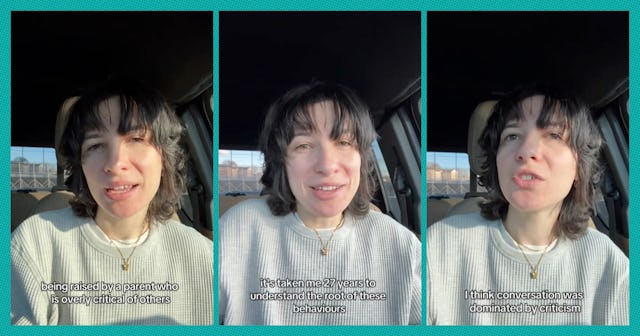How Criticizing Other People Can Hurt Your Child's Self Esteem
“Growing up in that kind of environment I think causes us to internalize a lot of this criticism and to interpret our parents' attitude as a reflection of how they secretly or not so secretly view us”

“If you don’t have something nice to say, don’t say anything at all.” We’ve all heard it at some point, many of us probably from our parents. But that’s not to say our parents were always practicing what they preached. And hey, nobody’s perfect, but it’s also important to be mindful about what messages we’re sending our kids.
TikTok user Casey Smith (@bigsiscasey)offers a warning of how more extreme cases of being critical of other people — not just our kids, but anyone — can adversely affect our children and their sense of self.
“Emotionally immature parents are egocentric and tend to focus on very superficial values like appearances and achievements as a way, I think, of coping with their own insecurities and emotional limitations,” she says. “My parent would constantly comment on and criticize others, whether it was the way that someone dressed, their values, the shape of their nose, the way they sounded when they sang a song, their hairline.”
And, sadly, Smith was not immune to her parent’s judgements. They were not shy about letting her know the ways she was falling short, from speaking negatively about her body, her voice, her hair, and choice of music and TV. “Growing up in that kind of environment I think causes us to internalize a lot of this criticism and to interpret our parents' attitude as a reflection of how they secretly or not so secretly view us,” she says.
Moreover, the constant criticism — of her and others — lead Smith to adopt a sort of “if you can’t beat them, join them” attitude, observing, “I remember when I was a kid sort of sharing in my parents criticism and becoming critical of others myself because the more I was like my parent the more my parents seemed to like me.”
Sadly, and perhaps predictably, it didn’t really help. Smith still found herself feeling insecure and unsure, adopting people pleasing behaviors as well as perfectionism, shame, and a deep fear of rejection. It also made her believe that everybody in her life — from teachers to strangers — was secretly judging her at all times. And that makes sense: when that’s what she was seeing behind closed doors in her own home, that was “normal” to her.
“Growing up with a parent who was overly critical of other people, and also critical sometimes of myself, it made me doubt myself and overthink my interests and my intentions. To disregard parts of myself that I liked but they didn’t.”
“It’s taken me 27 years to understand the root of these behaviors,” she concludes. “And I still sometimes find myself believing that other people think the worst of me.”
Growing up in the shadow of constant criticism can be hard to deconstruct and unlearn. If we go back into any one of these families, we can probably find that what was done to the child was done to the parent when they were a child, and so on. It explains it, but doesn’t excuse the behavior or make it OK. As parents, we need to be mindful of the patterns we’re repeating and what our children are hearing about the world through us.